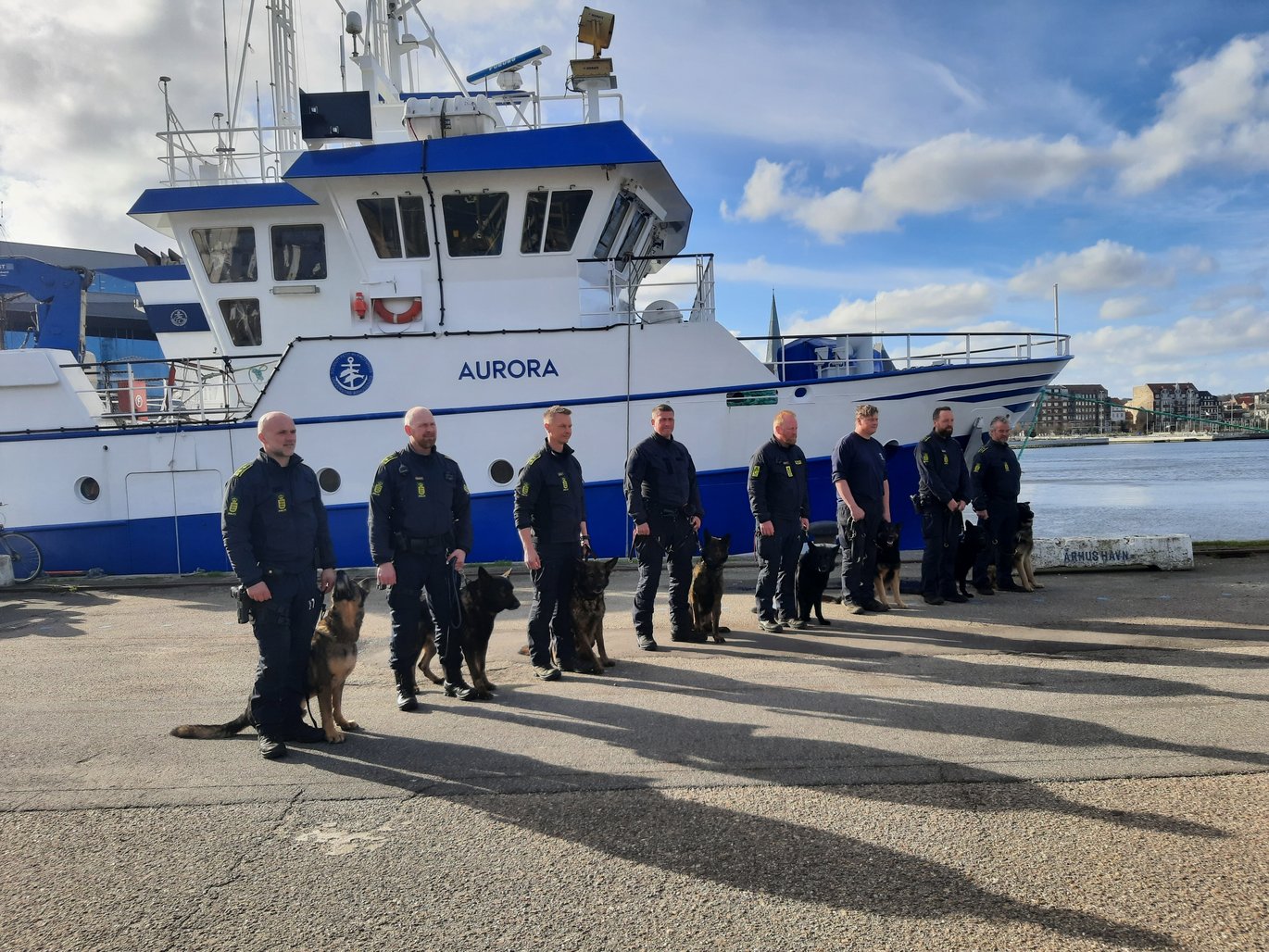Police: “Collaborating with AU makes a big difference when searching for missing persons in the water”
In seven years, the Danish police have created an elite unit of water search dogs that are highly trained to search for missing persons in water. Aarhus University supports the dogs in their search.

On this brisk April morning, the air echoes with the sound of dogs barking across the basins at the Port of Aarhus. Eight German Shepherds are lined up on the quayside with their handlers.
Today is no ordinary day of training. Today, the eight dogs will be tested to ensure they meet the requirements of the police dog unit – the closest thing Denmark has to a national team of police dogs. They begin training as puppies, learning to detect even the faintest scent trail and follow it until they locate their target. But even though the four-legged creatures pick up on small scents, the movement of these trail scents are affected by currents, wind and weather.
This is where research knowledge from Aarhus University comes into play, personified in the oceanographer and skipper of Aarhus University’s research vessel Aurora, Torben Vang.
“Police efforts have improved drastically since we started working with Torben Vang and the research vessel Aurora. Torben Vang’s assistance in searching for missing persons in water makes a big difference,” says Steen Staunsholm, national coordinator for water search dogs at the National Police Dog Centre.
Murder case prompted Danish search dog initiative
The collaboration between the police and Aarhus University began in 2017 during the murder case of journalist Kim Wall.
During the search for Kim Wall’s body, the Danish police were assisted by Swedish water search dogs that could identify the scent of bodies from above water. Torben Vang and his research vessel Aurora contributed to the investigation by calculating ocean currents. Ultimately, divers found the right location thanks to these calculations and the dogs’ indications.
"We were part of a very large and very important investigation where we were able to combine the historical data on the currents in Køge Bay with the signs found by the Swedish dogs and a number of other parameters. We were able to pinpoint an area for the divers to search. And it worked,” says Torben Vang about the efforts in 2017, for which he was later honoured with an award.
After having collaborated with the Swedish dogs, Danish police were inspired to train their own water search dogs. The unit currently consists of eight dogs and their handlers from different police districts across the country.
Collaboration makes us stronger
Although the water search dogs are excellent at searching, part of their training also includes research knowledge. Steen Stausholm stresses that this combination is key.
“Torben Vang’s knowledge of how the currents move and his method for calculating a missing person’s likely location are crucial to our search. By comparing maps on ocean currents with the time of the accident, Torben Vang can help pinpoint an area where a missing person might be,” says Steen Stausholm, who praises the collaboration with Aarhus University.
"The insights we gain from Torben Vang and the forensic pathologists serve as a cornerstone for the overall solution we as an authority deliver to citizens. We can also help relatives get answers faster, which is important in such an emotionally intense situation,” he says.
The Danish model is gaining ground
It doesn’t seem that other countries make use of similar collaborations between research institutions and police forces.
“I like to refer to it as ‘The Danish Model’, and I think we can already give our international colleagues a run for their money. Using this model, our policing becomes more efficient, our resources are better utilised, and we get better results. In the past, there might have been a tendency in the police force to think that we always knew best. We now know that's not true – we’re best when we work together,” says Steen Stausholm.
Torben Vang is pleased to assist in searching for missing persons in the water. He particularly commends the exchange of experiences across disciplines and with other research institutions.
“From an academic point of view it’s an interesting consultancy task. Working in a multidisciplinary setting allows us to collaborate with our colleagues at the University of Southern Denmark, with whom we evaluate cases we have consulted on. Academically, we benefit from the collaboration and it enhances the overall knowledge in the field,” says Torben Vang.
On a personal level, he is also happy to help out in these unfortunate cases.
“It means a lot to relatives to know that the police have done everything they can to find the missing person. I’m happy to be able to contribute to that,” says Torben Vang.
Seven dogs passed the test requirements that day.
Read the article (in Danish): Naturvidenskaben var afgørende i drabsefterforskning under havoverfladen
Contact:
Oceanographer, skipper Torben Vang
27 78 28 30